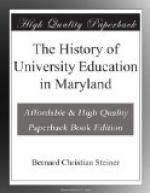is ‘scholarship.’ Scholarship is
a good thing, and we produce it. But the system
which turns out a few good scholars every year passes
over the heads of the great mass of university students
without having awakened them to any intellectual life;
the universities are scholarship-factories producing
good articles but with a terrible waste of raw material.
The other main type of university enthrones ‘research’
as its summum bonum. Possibly research is as
good a purpose as a man can set before him, but it
is not the sole aim in life. And when one contemplates
the band of recruits added each year to the army of
investigators, and the choice of ever minuter fields—not
to say lanes and alleys—of research, one
is led to doubt whether research is not one of the
disintegrating forces of society, and whether ever
increasing specialisation must not mean a perpetual
narrowing of human sympathies in the intellectual leaders
of mankind. Both types of university appear to
me to present the phenomena of a country suffering
from the effects of overproduction, where the energies
of workers had been concentrated upon adding to the
sum of wealth, and all too little attention had been
given to the distribution of that wealth through the
different ranks of the community. Just at this
point the University Extension movement appears to
recall academic energy from production to distribution;
suggesting that devotion to physics, economics, art,
can be just as truly shown by raising new classes
of the people to an interest in physical and economic
and aesthetic pursuits, as by adding to the discoveries
of science, or increasing the mass of art products.
To the young graduate, conscious that he has fairly
mastered the teaching of the past, and that he has
within him powers to make advances, I would suggest
the question whether, even for the highest powers,
there is any worthier field than to work through University
Extension towards the University of the Future.
FOOTNOTES:
[Footnote 53: The Cambridge fee is L45 per course of three months.]



